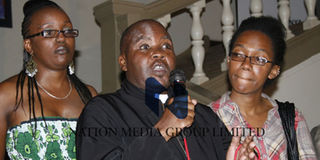Kenya gay demand recognition

Metropolitan Community Church Priest the Rev Michael Kimindu addresses a gathering of sexual minorities at the National Museum, Nairobi where they assembled to mark the International Day Against Homophobia on May 17, 2010. On his left is activist musician Kate Kamunde from Afra Kenya and Audrie Mbugua (right) from Transgender Kenya. Photo/FREDRICK ONYANGO
What you need to know:
- Event marked the annual International Day against Homophobia to initiate public dialogue among Kenyans on gender identity and sexual orientation.
Scores of Kenya homosexuals celebrated the International Day Against Homophobia in style Monday and demanded for more recognition.
The Lesbian Gay Bisexual Transgender and Intersex (LGBIT) persons wined, sung and danced and for the first time allowed media coverage of their function to fight stigma and victimisation associated with their sexual orientation.
“Ten years ago there was no public place that could have hosted such a function,” Kenya Human Rights Commission director Muthoni Wanyeki, whose lobby organised the event at the National Museums of Kenya, said.
“Although the Committee of Experts did not allow same sex marriage in Kenya. The Proposed Constitution would enable all Kenyans access health and are free from discrimination and violence. The basic rights are for all Kenyans including people from the gay community.”
Ms Wanyeki, however, said despite the government allowing the gay community to meet the battle against harassment of and violence against sexual minorities is still on.
Same sex relationships
Activist Kate Kamunde, who sung lyrics urging the gay to unite and battle hate crime and homophobia, said the community was facing a lot of violence and that some parents stopped paying fees for their children after discovering they were engaged in same sex relationship.
“People have to understand gay people are normal like anybody else only that they love differently. People think it is un-African or is a sickness. Spaces are, however, opening up to accommodate us which was not possible two years ago,” Ms Kamunde said.
Ms Kamunde regretted that government officials gave the function a wide birth despite being invited.
Mr Dennis Nzioka, a religious relationship assistant at Gay and Lesbian Coalition of Kenya (Galck), said experts put the population of homosexuals in the world at 6 percent, the same applied to Kenya and urged religious leaders to tolerate them.
“We are born this way. We are created this way. We want to feel comfortable when we come to church. They should stop preaching discrimination against gay people. Just as I am proud to be African I am proud of being gay. There’s nothing wrong with what we are doing,” the 24 year old said.
Mr Nzioka was happy that homosexuals could now be allowed to meet in the open and that his family also understands him.
“If we had a family meeting, I usually went with my boyfriend but I am currently not dating,” he said, adding that there were already many gay marriages in Kenya “although we don’t expect licensing in near future".
He said homosexuals need access to medical services and housing.
Condemn prejudice
Kenya National Commission on Human Rights (KNCHR) commissioner Lawrence Mute condemned prejudice on grounds of their sexual orientation.
“Let us ensure nobody is discriminated either in school, at work or even in the society especially because of who they are,” Mr Mute told participants.
Dr Ben Sihanya, the dean of the School of Law at the University of Nairobi emphasised on the need to focus on issues of sexual minorities in the country.
“We are quick at criminalising issues that we do not understand,” he challenged homophobes, who harbour negative attitudes and feelings towards homosexuality
Galck official David Kuria termed both religious homophobia and transphobia as ‘senseless violence,’ and called a society that was more tolerant to the welfare and needs of LGBIT persons in the country.
Transphobia refers to discrimination against transsexuality and transsexual or transgender people, based on the expression of their internal gender identity.
According to organisers, the event marked the annual International Day against Homophobia (IDAHO) in a bid to initiate public dialogue among Kenyans on gender identity and sexual orientation.
It also targeted to highlight the negative linkage between homophobia and the spread of HIV and the need for better access to health services for LGBIT persons.
It was also expected to promote peace build as diverse Kenyans to discourage intolerance of that begets violence.
On December 1, 2006 Galck participated in the World Aids Day. This was the first ever public event that the LGBTI persons were participating in Kenya, without having to hide their sexual orientation.




